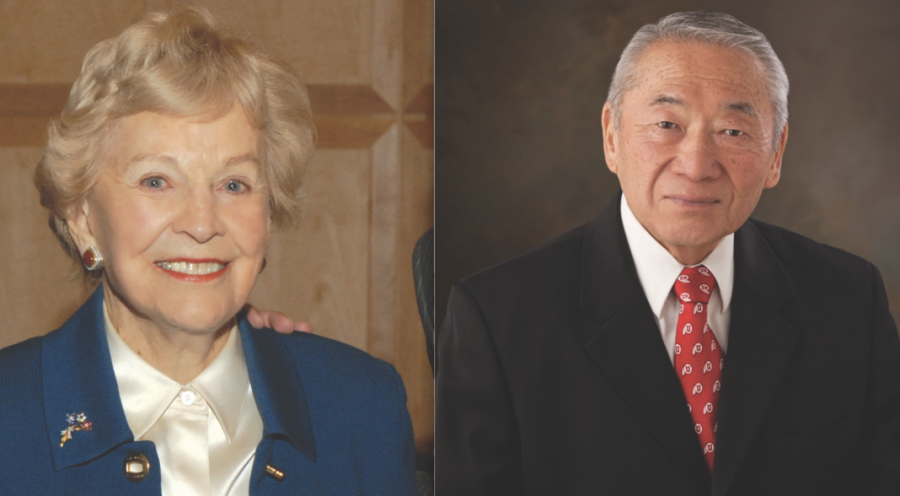The University of Utah Board of Trustees announced in March that Barbara Tanner and Raymond Uno will receive honorary doctorate degrees, the highest honor given by the university. They will receive the awards at the commencement ceremony on Thursday, May 3 at 6:30 p.m. at the Jon M. Huntsman Center.
Every year during commencement, honorary degrees are given to individuals who have made significant achievements in anything from arts, to business, to service in the community or university. The recipients are selected by the Honorary Degree Committee, which includes representatives from the faculty, the student body and the board of trustees. It assesses the nominations and a group of faculty advisors and administrators give additional input to help make the decision. The university president then selects recipients from the pool assembled by the committee.
“These two individuals are incredible examples of dedicated service and leadership, and their unfailing commitment to the university sets them apart as pillars in the community,” said Joe Sargetakis, the chair of the committee, in a press release. “We are proud to present them with this honor and recognize the significant contributions they have made throughout their careers.”
Barbara Lindquist Tanner
A true Utah native, Tanner grew up in Ogden and attended Ogden High School, Weber Jr. College and the University of Utah.
Her family was always involved in community activities as she grew up, according to the website for the Barbara L. and Tanner C. Tanner Center for Nonviolent Human Rights Advocacy in the College of Social and Behavioral Science at the U, which she founded with her husband in 2006.
“As her father developed his business, Barbara’s mother was the community leader,” read the page. “She was always cooking for those who were in need of food and sewing for those who were in need of clothes. Barbara’s mother was her inspiration for helping others.”
From an early age, Tanner was raised to believe it was her duty to give back to the community. Throughout her career, she pursued a variety of passions including community leadership, humanitarian efforts, human rights, philanthropy and education — all of which she began after obtaining a degree in education from the U.
During her time at the U, Tanner joined the debate team. She met her late husband, Norman Tanner, when she was matched up against him in a debate competition. Norman and Barbara Tanner were later married and went on to have four children. They were known for their outdoor adventures and involvement as a family.
Norman Tanner went on to propel the O.C. Tanner manufacturing company to success, giving Barbara Tanner ample time to pursue her passions. She was actively involved in the company and was a firm believer in equal rights, so she did her best to ensure everyone in the company was taken care of. She would inquire whether employees had healthcare, if women were promoted in a timely manner and if each person was treated fairly.
Along with establishing the Tanner Center for Human Rights, she helped organize the Utah Youth Village, a nonprofit once known as Utah Girls’ Village, aimed at helping disadvantaged children. She also served on the Utah Symphony Board, was president of the Utah Symphony Guild and has received a number of honors and degrees from various institutions in the community.
Raymond Sonji Uno
Raymond Sonji Uno is another Utah success story. He was born in Ogden in the back of a taxi cab and was named Raymond after the driver. He lived in a low income area of Ogden, and when Uno’s father got a job in California, his family relocated. There, he went to a segregated school.
In 1942, Uno was forced into a United States Government Camp as part of the Japanese internment during World War II, along with 120,000 other people of Japanese ancestry. During that time, his father died.
After the war, Uno dedicated himself to his education. It proved to be an experience of hard work for Uno. He worked as a dishwasher, farm worker and railroad track layer in order to pay for school and living expenses.
Upon graduation, Uno joined the U.S. Army in spite of his prior internment by the U.S. government. There he was put into a Japanese language program for two years. During the Korean War, Uno was sent to a base in Japan, which allowed him to meet some of his Japanese relatives.
After his military service, Uno worked a variety of jobs while earning multiple degrees from the U, including a Juris Doctorate in 1958. He went on to break many barriers in his law career.
Uno first was a referee of the juvenile court and later rose to be deputy Salt Lake County attorney and the assistant attorney general of Utah. He became the first Utah state judge who was a person of color.
“He served for almost a quarter of a century as a judge to the Salt Lake City Court, 5th Circuit Court, Third District Court and as a senior Third District Court judge,” according to the U’s press release. “Although he retired in 1990, he continued to serve for many years as a senior Third District Court judge.”
Uno served on the boards of KUED and the College of Social and Behavioral Science. He is a member of the U’s Alumni Association and Emeritus Alumni Board. At 87 years old, Uno regularly attends basketball and football games at the U.
c.macdonald@dailyutahchronicle.com
@TheChrony


